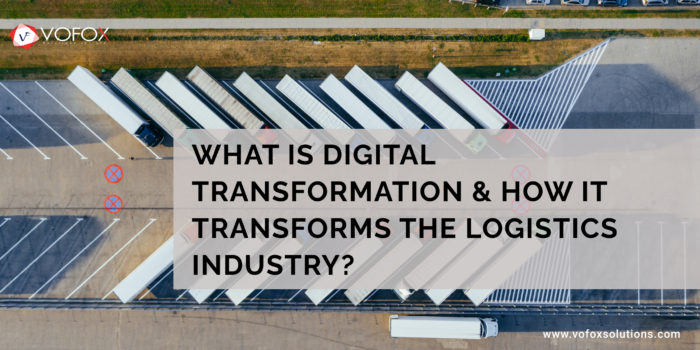- February 26, 2021 1:54 pm
- by Aruthra
- February 26, 2021 1:54 pm
- by Aruthra

Digital Transformation is a commonly used buzzword these days and it sounds pretty cool, but what exactly does it mean? What does digital transformation mean for the logistics industry? And how does it transform it? Let’s find out from this blog post. Let’s begin.
In its simplest terms, Digital Transformation is the use of any sort of technology or the adoption of fresh & innovative ways to do business that ultimately helps businesses to grow at a faster pace, improve efficiency and streamline processes. This could be a replacement or an improvement of the system they used before with the help of advanced technologies such as blockchain, AI/ML, robotics, mixed reality, or even the Internet of things (IoT).
The history of Digital Transformation can be traced back to the early 90s where most businesses predominantly used spreadsheets and other types of rudimentary technology that’s pretty basic today. Over the years the majority of enterprise level businesses shifted to enterprise resource planning software that allowed them to get more visibility of their business, their financial information, sales information, etc. After the explosion of technologies that revolutionized the IT industry in the past decade, more businesses approached software development companies to integrate them into their existing ERP system. This ultimately allowed them to increase their operational efficiency up to 80% when compared to their existing system. In the transition towards digital transformation, businesses always have to transform their analog information & manual processes into digitized processes. By digitally transforming core business processes that include operations, supply chain, ERP, customer services, accounting, etc, business owners can generate better outcomes by interlinking their people, places, and things.
Like all other industries, logistics companies are also adopting futuristic technologies & processes to optimize and improve their business efficiency. According to a recent report published by Forbes, nearly 70% of logistics consultants say they believe in productivity gains as a result of the accelerated adoption of futuristic technologies. Whereas, half of the respondents say they have an outlook that technology can greatly enhance customer experience, powered by solutions like AI and ML. Below we will list down some of the key technologies that will digitally transform the logistics industry in the upcoming years.
AI and ML powered technologies are accelerating business efficiency in the realm of supply chain and logistics. AI and ML have greatly optimized today’s logistics industry by minimizing the chances of errors, thus improving their operational efficiency. By efficiently capturing and processing millions of structured and unstructured data from logistics operations to its full potential, Machine Learning algorithms can identify specific patterns and generate intelligent insight that enables logistics managers to avoid risks, anticipate events and build solutions. By coupling it with Natural Language Processing (NLP), logistics managers can detect anomalies associated with their operational areas.
IoT is still in its early stages but it is taking hold in the Logistics industry ushering in a new wave of disruption. There has been a significant improvement in the visibility of logistics Businesses that incorporated this technology. Tracking and visibility of shipments are the number one priority of all logistics companies and these are also one of their main challenges. However, they can effectively address these challenges by incorporating IoT to collect all their siloed data. The data collected from IoT devices can be efficiently used to track their shipments in real-time, at the same time making analytics-driven insights available to their logistics managers.
Automating high volumes of repetitive computer based logistics management processes can make businesses more streamlined. Robotic Process Automation (RPA) does exactly that. By efficiently tapping the potential of this technology, logistics businesses can automate repetitive and manual data entry between multiple nonintegrated systems. The result, 60% reduction in employee dependency and higher levels of productivity.
Like all other technologies that we mentioned above, Predictive analytics is revolutionizing the logistics industry. Logistic companies often rely on Predictive analytics to forecast future trends that impact their business. This helps logistics managers to better anticipate issues and recommend actions. Predictive analytics use machine learning or multiple statistical methods that include regression & extrapolation to analyze and extrapolate historical data. The data collected can be from any source such as data from sensors embedded in shipments, pick up & delivery data, weather, etc.
With more and more logistics companies adopting Digital transformation, it will no longer be a differentiator but a core component for any logistics business.
Guaranteed Response within One Business Day!

How Much Does It Cost to Design an App?

Angular Best Practices For Web Applications

How to Set Up a Development Environment in React.JS?

What are the 6 Models Used In SDLC?

Why React Front-End Development is the Best